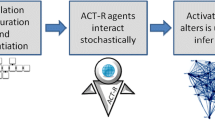Abstract
The paper aims at presenting an agent-based modeling exercise to illustrate how small differences in the cognitive properties of agents can generate very different macro social properties. We argue that it is not necessary to assume highly complicated cognitive architectures to introduce cognitive properties that matter for computational social science purposes. Our model is based on different simulation settings characterized by a gradual sophistication of behavior of agents, from simple heuristics to macro-micro feedback and other second-order properties. Agents are localized in a spatial interaction context. They have an individual task but are influenced by a collective coordination problem. The simulation results show that agents can generate efficiency at a macro level particularly when socio-cognitive sophistication of their behavior increases.
Similar content being viewed by others
References
Axelrod R (1997) The complexity of cooperation. Agent-based models of competition and collaboration. Princeton University Press, Princeton
Barkow JH, Cosmides L, Tooby J (1995) The adapted mind: evolutionary psychology and the generation of culture. Oxford University Press, London
Buchanan M (2007) The social atom. Why the rich get richer, cheaters get caught, and your neighbor usually looks like you. Bloomsbury, London
Conte R (1999) Social intelligence among autonomous agents. Comput Math Organ Theory 5(3):203–228
Conte R, Castelfranchi C (1996) Simulating multi-agent interdependencies: a two-way approach to the micro-macro link. In: Troitzsch KG, Mueller U, Gilbert N, Doran J (eds) Social science microsimulation. Springer, Berlin, pp 394–415
Conte R, Edmonds B, Moss S, Sawyer RK (2001) Sociology and social theory in agent-based social simulation: a symposium. Comput Math Organ Theory 7:183–205
Conte R, Hegselmann R, Terna P (eds) (1997) Simulating social phenomena. Springer, Berlin
Epstein JM (2006) Generative social science. Studies in agent-based computational modeling. Princeton University Press, Princeton
Flache A, Hedgselmann R (1999) Rationality vs learning in the evolution of solidarity networks: a theoretical comparison. Comput Math Organ Theory 5(2):97–127
Gigerenzer G, Selten R (2001) Rethinking rationality. In: Bounded rationality-the adaptive toolbox. MIT Press, Cambridge
Gilbert N (1996) Holism, individualism and emergent properties. An approach from the perspective of simulation. In: Hegselmann R, Mueller U, Troitzsch KG (eds) Modelling and simulation in the social sciences from the philosophy of sciences point of view. Kluwer Academic, Dordrecht, pp 1–27
Gilbert N (2002) Varieties of emergence. In: Sallach D (ed), Social agents: ecology, exchange, and evolution. Agent 2002 Conference. University of Chicago and Argonne National Laboratory, pp. 41–56
Gilbert N (2005) When does social simulation need cognitive models? In: Sun R (ed) Cognition and multi-agent interaction: from cognitive modeling to social simulation. Cambridge University Press, Cambridge, pp 428–432
Gilbert N (2008) Agent-based models. Sage Publications, London
Gilbert N, Terna P (2000) How to build and use agent-based models in social science. Mind Soc I(1):57–72
Hales D (2000) Cooperation without space or memory: tags, groups and the Prisoner’s dilemma. In: Moss S, Davidsson P (eds) Multi-agent based simulation. Springer, Berlin
Hedström P (2005) Dissecting the social. On the principle of analytical sociology. Cambridge University Press, Cambridge
Jager W, Janssen MA, de Vries BJM, de Greef J, Vlek CA (2000) Behavior in commons dilemmas: homo-economicus and homo-psychologicus in an ecological-economic model. Ecol Econ 35:357–379
Macy MW (1990) Learning theory and the logic of critical mass. Am Soc Rev 55:809–826
Mezias SJ (1988) Aspiration level effects: an empirical investigation. J Econ Behav Organ 10:389–400
Murphy PR, Mezias S, Chen YR (2001) Adapting aspirations to feedback: the role of success and failure. In: Lant TK, Shapira Z (eds) Organizational cognition. Computation and interpretation. Lawrence Erlbaum Associates, London, pp 125–146
Powell WW, DiMaggio P (eds) (1991) The new institutionalism in organizational analysis. University of Chicago Press, Chicago
Prietula MJ, Carley KM, Gasser L (eds) (1998) Simulating organizations. Computational models of institutions and organizations. MIT Press, Cambridge
Riolo RL, Cohen MD, Axelrod R (2001) Evolution of cooperation without reciprocity. Nature 414:441–443
Sawyer RK (2005) Social emergence. Societies as complex systems. Cambridge University Press, Cambridge
Sun R (2001) Cognitive science meets multi-agent systems: a prolegomenon. Philos Psychol 14(1):5–28
Author information
Authors and Affiliations
Corresponding author
Rights and permissions
About this article
Cite this article
Boero, R., Castellani, M. & Squazzoni, F. Individual behavior and macro social properties. An agent-based model. Comput Math Organiz Theor 14, 156–174 (2008). https://doi.org/10.1007/s10588-008-9025-3
Published:
Issue Date:
DOI: https://doi.org/10.1007/s10588-008-9025-3




